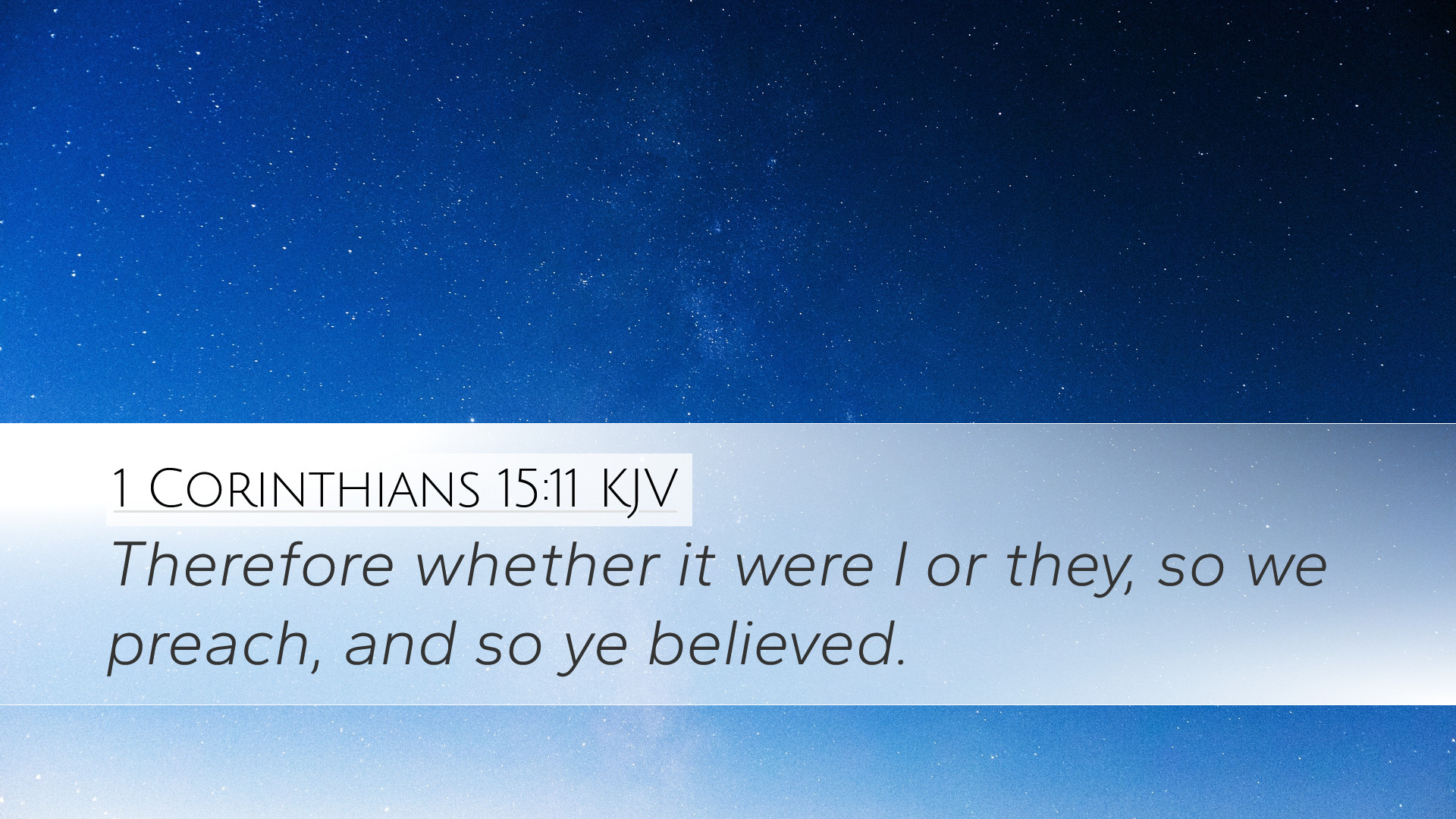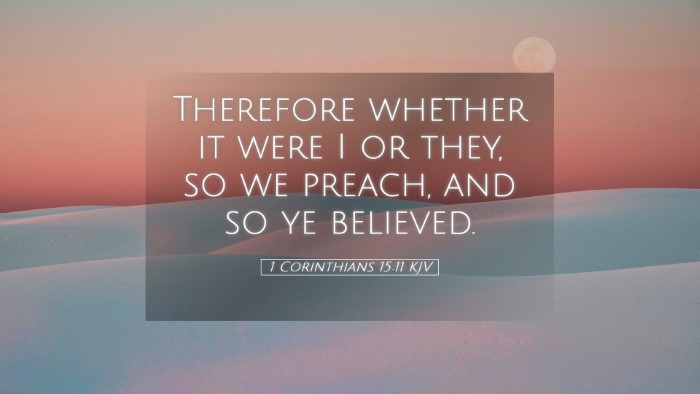Bible Commentary on 1 Corinthians 15:11
Bible Verse: 1 Corinthians 15:11 - "Therefore whether it were I or they, so we preach, and so ye believed."
Introduction
The apostle Paul, in this brief yet powerful verse, emphasizes the unity of the Gospel proclamation amongst himself and other apostles. The context of this verse is rooted in the resurrection of Christ, a central theme of Paul's epistle. Understanding this verse requires a deep dive into the implications of preaching and belief within the early church.
Exegesis and Context
Matthew Henry notes that the Apostle Paul is confirming the consistency of the message among those who preached the resurrection. Paul expresses that whether it was he or the other apostles who preached, the message was the same, geared towards the central truth of Christ’s resurrection.
Albert Barnes elaborates on the idea that the unity in preaching is a crucial aspect of the Christian faith. The implication is clear: the apostles, despite their unique backgrounds and styles, united on the essential tenet of Christ’s resurrection which assures believers of their faith.
Adam Clarke provides insight into the implications of this unity, emphasizing that the belief of the Corinthians hinges on the foundation laid by these varied preachers. The emphasis is on the authenticity of belief received by the early church, regardless of the messenger.
Thematic Insights
- Unity in Message: The central idea is the unity among diverse messengers. Paul highlights that the church's belief is built on a coherent and shared proclamation of the resurrection, which serves as a powerful reminder against division (1 Corinthians 1:10).
- Faith and Belief: The phrase "so ye believed" indicates that belief is not a passive act but a response to the preached word. The active belief of the Corinthians is fundamental to their standing as Christ’s followers, validating the message of the Gospel.
- The Resurrection as Foundation: The resurrection is pivotal to Christian doctrine. Paul’s insistence on its centrality in the preaching reminds us that without the resurrection, Christian faith is rendered void (1 Corinthians 15:14).
Practical Application
For pastors and theologians, this verse serves as a powerful reminder of the essential truths that must be preached. The clarity and consistency in communicating Christ’s resurrection is paramount in teaching and preaching contexts.
Barnes asserts that modern-day preachers should emulate this approach. It is not the individual’s style or personality that should be emphasized but rather the unchanging message of the Gospel.
Clarke encourages believers to remain steadfast in the faith established by these preachers, reminding us that the foundation laid by early apostles still holds relevance today. Each believer’s personal faith ties back to this unified message, underscoring the importance of strong, doctrinally sound preaching in churches.
Theological Reflections
Reflecting on this verse offers profound theological implications:
- The Role of Apostolic Teaching: The recognition that the apostles were carriers of a divine message underscores the necessity of adhering to sound doctrine as represented in Scripture.
- Community of Believers: The collective belief in the resurrection builds community within the church. This verse challenges believers to uphold the unity of faith, as the Gospel transcends personal preferences or differences.
- Timelessness of the Gospel: The assurance that whether by Paul or another apostle, the message remains unchanged, speaks to the timeless nature of God's Word that continues to call believers today.
Conclusion
1 Corinthians 15:11 encapsulates the essence of unity in Christ’s message among the apostles. For pastors, students, theologians, and scholars, it serves as a significant reminder to reflect on the power of the preached word, the necessity of belief, and the foundational truth of the resurrection. In a world that often seeks division, this verse stands as a beacon of hope, illustrating that no matter the messenger, the central message of Christ remains constant and transformative.
As we dissect and meditate on such scriptures, we are called to reflect on our roles as sentinels of the truth and to emulate the early church’s commitment to the unity of faith as centered in Christ and His resurrection.


